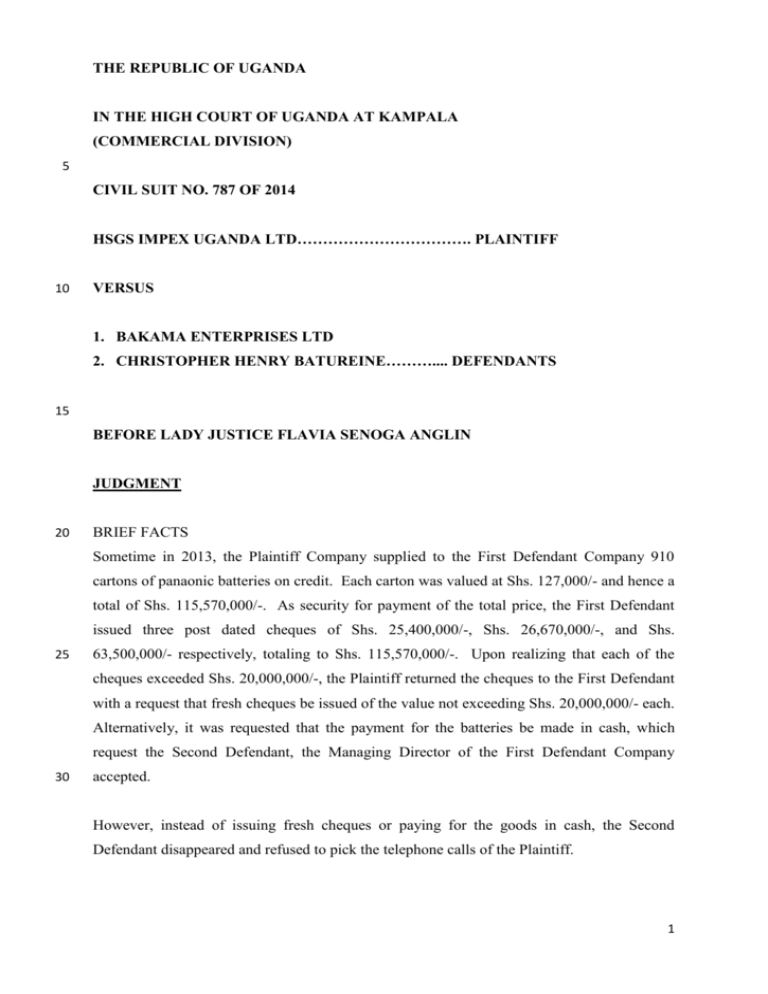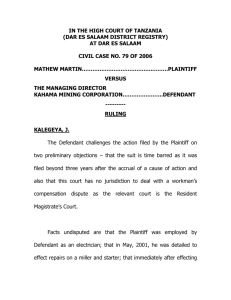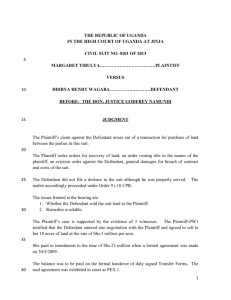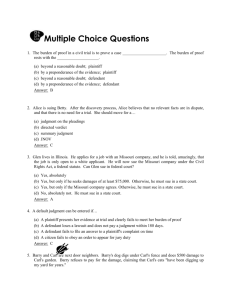commercial-court-2015-116
advertisement

THE REPUBLIC OF UGANDA IN THE HIGH COURT OF UGANDA AT KAMPALA (COMMERCIAL DIVISION) 5 CIVIL SUIT NO. 787 OF 2014 HSGS IMPEX UGANDA LTD……………………………. PLAINTIFF 10 VERSUS 1. BAKAMA ENTERPRISES LTD 2. CHRISTOPHER HENRY BATUREINE……….... DEFENDANTS 15 BEFORE LADY JUSTICE FLAVIA SENOGA ANGLIN JUDGMENT 20 BRIEF FACTS Sometime in 2013, the Plaintiff Company supplied to the First Defendant Company 910 cartons of panaonic batteries on credit. Each carton was valued at Shs. 127,000/- and hence a total of Shs. 115,570,000/-. As security for payment of the total price, the First Defendant issued three post dated cheques of Shs. 25,400,000/-, Shs. 26,670,000/-, and Shs. 25 63,500,000/- respectively, totaling to Shs. 115,570,000/-. Upon realizing that each of the cheques exceeded Shs. 20,000,000/-, the Plaintiff returned the cheques to the First Defendant with a request that fresh cheques be issued of the value not exceeding Shs. 20,000,000/- each. Alternatively, it was requested that the payment for the batteries be made in cash, which request the Second Defendant, the Managing Director of the First Defendant Company 30 accepted. However, instead of issuing fresh cheques or paying for the goods in cash, the Second Defendant disappeared and refused to pick the telephone calls of the Plaintiff. 1 After protracted search for the Second Defendant, he was found in rural Masindi and brought back to Kampala. The Second Defendant declared that the First Defendant was unable to pay for the batteries and offered to return all of them to the Plaintiff, which the Plaintiff accepted. 5 A written agreement was executed between the Plaintiff and the First Defendant for the return of the batteries. The Second Defendant co- executed the agreement as a guarantor for the return of the batteries and for performance. Five cheques for a total of Shs. 90,075,000/- were issued as security, with agreement that the 10 Plaintiff would bank the cheques if the Defendants failed to return the batteries. The Plaintiff recovered 205 cartons of batteries from the Defendants’ store in Nateete. The Defendants failed to return 705 cartons worth Shs. 89,535,000/-. 15 When Plaintiff banked the cheques, they were dishonored on the grounds that the First Defendant’s account was in red. When the Second Defendant was notified of the dishonor of the cheques, he claimed that the Uganda National Bureau of Standards (UNBS) had condemned the batteries for being defective. But UNBS took samples from the Plaintiffs stores for analysis and cleared the batteries as satisfying the required standards. 20 Nevertheless, the Defendants failed to return the 705 cartons worth Shs. 89,535,000/- or make good the bounced cheques worth Shs. 90,075,000/-. Hence this suit. The suit was filed on 04.11.2014 and summons to file a defence were issued to be served 25 upon the Defendants. On 09.12.14, chamber summons were filed by the Plaintiff seeking orders of this court to issue summons to file defence to be served by way of substituted service. 30 The summons were supported by an affidavit deponed by David Banturaki, a Process Server in the Plaintiff’s Advocates firm. An amended chamber summons exparte was filed on 02.02.15 seeking the same orders; supported by a supplementary affidavit deponed by Girish Diwakar. 35 2 The application was heard by the Registrar on 05.02.15. The time within which to serve summons was extended for three weeks and application to serve summons by Advertisement in any Newspaper widely read was allowed. 5 The summons were served by Advertisement in the Monitor Newspaper on 13.02.15 (copy on the file) and an affidavit of service deponed by Augustine Twesigire Advocate, filed on 03.03.15. On the same date, Counsel for the Plaintiff applied for interlocutory judgment to be entered 10 against the Defendants under 0.9 r 8 C.P.R as the Defendants had failed to file a defence. Interlocutory judgment was accordingly entered by the Registrar on the same date and suit was set down for formal proof. 15 On 16.03.15 suit was called for formal proof and the witness Girish Diwakar was called for the Plaintiff. The witness a Director of the Plaintiff Company testified reiterating the facts already set out herein. The first three cheques of over Shs. 20,000,000/- each were identified and tendered as 20 Exhibits P1A, P1B and P1C respectively. The agreement made between the parties, after the Second Defendant was found and returned to Kampala, dated 16.12.13, was tendered as Exhibit P2. And the five bounced cheques which were dishonored were also admitted in evidence as Exhibits P3D, P3E, P3F, P3G and 25 P3H respectively. The UNBS report, letter and certificate of analysis were admitted in evidence as Exhibits P4 (a), P4 (b) and P4(c) after comparison with the originals. 30 The witness then contended that because of the bounced cheques, he suffered embarrassment before the banks and also lost credibility. Further that the Plaintiff incurred expenses looking for the Second Defendant for three – four months travelling between Kabaale, Masindi and Hoima. This was coupled with abuses by 3 the Second Defendant and losses incurred by the business as a result of the funds held by the Defendants. It was prayed that the Defendants be directed to pay the balance of the money due and owing 5 to the Plaintiff, general damages, plus interest from the date of supply to date, together with costs of the suit. Counsel for the Plaintiff filed written submissions and the following issues were set out:- 10 1) Whether or not there was a contract of sale of goods between the Plaintiff and First Defendant. 2) Whether or not the contract was breached by the First Defendant. 15 3) Remedies available. Whether or not there was a contract of sale of goods between the Plaintiff and the Defendants. 20 It is apparent from the facts of the case and the evidence of PW1 that initially there was a contract of sale of goods between the parties. The Plaintiff at the instance of the Defendants supplied batteries (127 cartons) valued at Shs. 115,570,000/- which sum the Defendants failed to pay as agreed. Due to the circumstances already explained herein, the said contract was disclosed by agreement of both parties and replaced by another agreement for the return 25 of batteries. By this new agreement, the ownership of the batteries reverted back to the Plaintiff. And as pointed out by Counsel for the Plaintiff, the effect of the new contract was to impose obligations of a bailee upon the First Defendant to interalia return the batteries to the 30 Plaintiff. The new agreement extended obligations to the Second Defendant as guarantor for the performance of the First Defendant’s obligations as bailee under the contract. Under S.89 of the contract’s Act, “where a person in possession of goods under another contract holds goods as bailee, that person becomes a bailee under the existing contract 4 and the owner becomes the bailor of the goods although the goods may not have been delivered by way of bailment”. When the parties entered into the second agreement requiring the Defendant to return the 5 goods, the Defendants ceased to be owners of the batteries and simply became possessors. The Plaintiff on the other hand gained ownership of the batteries and the Defendants were therefore holding the batteries on behalf of the Plaintiff as bailees and the Plaintiff as bailor. The second Defendant guaranteed the performance of the First Defendant under the new contract. 10 Court therefore finds that there was a contract of bailment between the Plaintiff and the Defendants. I am fortified in my decision by the case of Sylvan Kakugu Tumwesigye vs. Trans Sahara International General TRDG LLC – where Justice Kiryabwire defined a contract of bailment as “a transaction under which goods are delivered by one party (bailor) to another (bailee) on terms which normally require the bailee to hold the good ultimately 15 to redeliver them to the bailor or in accordance with his directions” - See also “the Sale of Goods” by P.S Atiyah. The Defendants in the present case did not dispute the contract of bailment since they did not defend the suit. 20 Whether or not the Defendants breached the contract:- The Defendants had an obligation to return the goods to the Plaintiff as bailor. It is very clear from the evidence on record that the Defendants only returned part of the goods, 205 cartons 25 and issued other cheques to cover the reminder of the cartons, worth Shs. 89,535,000/- (705 cartons). The cheques were worth Shs. 90,075,000/-. When the Plaintiff banked the cheques, they were dishonored on the ground that the Defendants’ Account was in red. – See Exhibits P3D, P3E, P3F, P3G and P3H. 30 Informed of the dishonored cheques, the Second Defendant instead contended that the UNBS had condemned the batteries for being defective. However, the UNBS report, letter and certificate of analysis of the sample of the batteries shows that the batteries are of the required standard. – See Exhibits P4 (a), P4 (b) and P4(c). The evidence was not disputed. 5 By alleging that the batteries were defective, it appears that the Defendants were only trying to wriggle out of their obligations under the contract. The Defendants having failed to fulfill their obligations under the contract of bailment, court finds that there was a breach of the said contract. 5 The Second Defendant being a guarantor of the First Defendant is equally liable for the fault / breach of the First Defendant. Under S.71 of the Contracts Act, liability of a guarantor is coextensive. The section provides that: S.71 Liability of a Guarantor: 10 1) The liability of a guarantor shall be to the extent to which a principal debtor is liable, unless otherwise provided by a contract. 2) For the purpose of this section, the liability of a guarantor takes effect upon default by the principal debtor. 15 Remedies: The Plaintiff claims special and general damages, interest on both sums and costs of the suit. 20 Despite that the suit was not defended, the burden remained on the Plaintiff to prove on a balance of probabilities that it is entitled to the remedies sought. Refer to the case of Mutekanga vs. Equator Growers (U) Ltd [1995 – 1998] EA 205SC where it was held “Even where interlocutory judgment has been entered, the burden of proof rests on the Plaintiff and the Standard of proof is on the balance of probabilities”. 25 Special Damages: S.61 of the Contracts Act entitles a party who suffers from breach of the contract, compensation for loss or damage. This damage is based on the loss of the Plaintiff and not 30 the gain of the Defendant. “Special damages must be specifically pleaded by the injured party and they must also be proved exactly, on the balance of probabilities. This rule applies whether a suit proceeds interparties or exparte”. – See the case of Mutekanga vs. Equator Growers (U) Ltd 6 (Supra) and the case of Uganda Telecom Ltd vs. Tanzanite Corporation C.A. 17/2004 – Justice Oder JSC as he then was. “The purpose for grant of special damages is to place the injured party back into the 5 position they would have been had the contract been performed” The Plaintiff in the present case pleaded special damages in paragraphs 4 and 5 of the plaint. Evidence was adduced by PW1 to the effect that batteries worth Shs. 115,570,000/- were supplied to the First Defendant on credit. The First Defendant failed to pay for the batteries 10 whereupon a new contract was entered into. By this new contract, the first Defendant undertook to return all the batteries to the Defendant. This was guaranteed by the Second Defendant. Only 205 cartons of batteries out of the 910 cartons were returned to the Plaintiff. The remaining 705 cartons worth Sh. 89,535,000/15 were not returned. The cheques issued by the Defendants as security in the sum of Shs. 90,075,000/- were dishonored when presented for payment. 20 Counsel for the Plaintiff submitted that the Plaintiff is entitled to the value fo the said five bounced cheques of Sh. 90,075,000/- in total. Alternatively that the Plaintiff is entitled to recover Shs. 89,535,000/- being the value of the 705 cartons of the batteries the Defendants failed to return. 25 S. 99 of the Contracts Act was relied upon to support the arguments. It provides that “where by the Default of the bailee, the goods are not returned, delivered or tendered at the proper time, the bailee is responsible to the bailor for any loss, destruction or deterioriation of the goods from that time”. 30 In the circumstances of this case, the appropriate special damages for the Plaintiff is the Shs. 89,535,000/- being the value of the 705 cartons of batteries that were not delivered by the Defendant. 7 Under clause 3 “Deed of Discharge of Sale of Batteries” the Second Defendant personally guaranteed the return of the batteries and undertook to be personally liable in event of failure by the Company to fulfill its obligations. – See Exhibits P2. 5 The sum of Shs. 89,535,000/- is therefore awarded to the Plaintiff as special damages. General Damages: The Plaintiff claimed general damages on the ground that the Company suffered substantial 10 loss and dange as a result of the Defendants’ breach of eth contract. It was the uncontroverted evidence of the Defendant that a private investigator had to be hired to track the Second Defendant in Kabaale, Homia and Masindi. The Company was blacklisted by its bankers on account of the many bouncing cheques. There was also the 15 inconvenience of making numerous telephone calls which the Second Defendant was not answering, coupled with embarrassment and due to the insults of the Second Defendant upon his being brought back to Kampala. The Plaintiff also had to have samples of batteries analysed by UNBS after the Second Defendant alleged that the batteries were defective. And the Plaintiff has suffered protracted deprivation of business as a result if the Defendants 20 failure to return all the batteries or to pay their moneys worth. Counsel for the Plaintiff stated that for all that inconvenience and loss, the Plaintiff is entitled to an award of substantial general damages. He proposed a sum of Shs. 30,000,000/- as a reasonable amount of compensation. 25 It has been established by decided cases that “Damages may be awarded for inconvenience caused by the Defendant” – UCB vs Kigozi [2002] IEA 305. And that “to be eligible for general damages, the Plaintiff should have suffered loss or inconvenience to justify award of general damages” – Musisi Edward vs Babihuga Hild [2007] HCB Vol. 1 83 at Pp. 84. 30 “It is now also settled that substantial physical inconvenienc, or even inconvenience which is not strictly physical, and discomfort caused by breach of contract will entitle the Plaintiff to damages” – Robbialac Paints (U) Ltd vs. K.B Construction Ltd [1976] HCB 49. 8 The evidence of the Plaintiff clearly indicates that the Company suffered inconvenience though not physical, discomfort and loss as a result of the Defendants’ conduct. The Plaintiff is accordingly entitled to general damages. 5 Nonetheless, I am mindful of the fact that courts have resolved that “as a general rule the Plaintiff is not expected to receive more than or receive less than in appropriate measure the damage which would be commensurate to his or her loss” – Refer to Ssemate vs. Seninde HCCS 409/2014 and a paper “Principles Governing the Award of Damages in 10 Civil Cases” by Hon. Justice Bart _ Katureebe as he then was. Bearing the above in mind, I find that the sum of Shs. 30,000,000/- proposed by Counsel for the Plaintiff as general damages are excessive. The sum of Shs. 10,000,000/- is therefore awarded as general damges. 15 Interest: The Plaintiff prayed for interest on the special and general damages at the rate of 23% per annum from 02.10.13 when the batteries were supplied to the Defendant. The parties did not agree on interest. 20 Under S.26 (2) C.P.A, the court has discretion to award interest on the principal sum at any rate considered reasonable. “The basis for grant of interest is that the Defendant has kept the Plaintiff out of his money and ought accordingly to compensate him” – See Pica Printery and Stationery Ltd 25 vs. Pallisa District Local Government HCCS 456/2006. The Defendants in this case have deprived the Plaintiff of its money since October, 2013. Counsel for Plaintiff prayed for interest at the rate of 23% contending that it is the current average commercial interest rate. 30 But this court exercises its discretion to grant interest at the rate of 21% per annum from the date of filing the suit until payment in full. Interest on general damages is granted at the rate of 6% per annum from the date of judgment 35 until payment in full. 9 Costs: “Costs follow the event unless for good cause court orders otherwise” – S.27 (2) C.P.A and 5 Arvinel vs. Kato and Another HCCS 394/2011. But courts have emphasized that “a successful party can only be deprived of costs when it is shown that its conduct, either prior to or suring the course of the suit has led to litigation which, but for his /her own conduct, might have been avioided….” – Rwantale vs. Rwabutoga [1988-90] HCB 100. 10 There is nothing to indicate that it is the conduct of the Plaintiff that led to the suit. It is the conduct of the Defendant as already shown in this judgment that left the Plaintiff with no choice but to file the suit. The Plaintiff is entitled to the costs of the suit and they are hereby awarded. 15 Judgment is entered for the Plaintiff in the following terms:- 1) Special Damages of Shs. 89,535,000/- being the value of the 705 cartons of batteries the Defendants failed to return to the Plaintiff. 20 2) Shs. 10,000,000/- general damages for loss and inconvenience suffered by the Plaintiff. 3) Interest on special damages at the rate of 21% per annum from date of filing the suit till payment in full and interest on general damages at the rate of 6% per annum from the date of judgment until payment in full. 25 4) Costs of the suit. 30 FLAVIA SENOGA ANGLIN JUDGE 19.08.15 10









